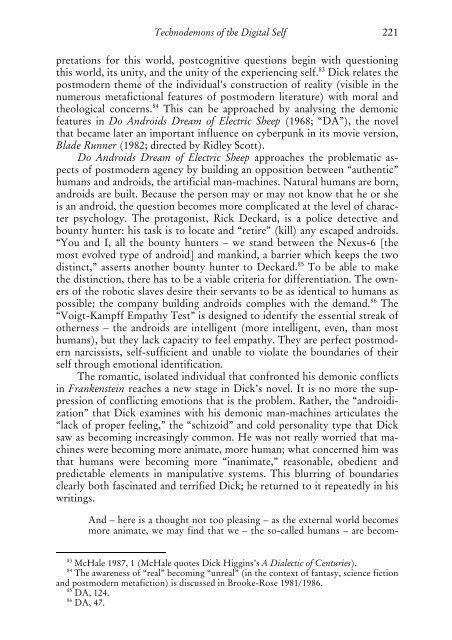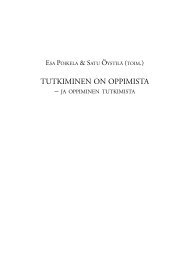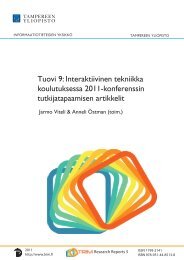Note on this edition: this is an electronic version of the 1999 book ...
Note on this edition: this is an electronic version of the 1999 book ...
Note on this edition: this is an electronic version of the 1999 book ...
You also want an ePaper? Increase the reach of your titles
YUMPU automatically turns print PDFs into web optimized ePapers that Google loves.
Technodem<strong>on</strong>s <strong>of</strong> <strong>the</strong> Digital Self 221pretati<strong>on</strong>s for <strong>th<strong>is</strong></strong> world, postcognitive questi<strong>on</strong>s begin with questi<strong>on</strong>ing<strong>th<strong>is</strong></strong> world, its unity, <strong>an</strong>d <strong>the</strong> unity <strong>of</strong> <strong>the</strong> experiencing self. 83 Dick relates <strong>the</strong>postmodern <strong>the</strong>me <strong>of</strong> <strong>the</strong> individual’s c<strong>on</strong>structi<strong>on</strong> <strong>of</strong> reality (v<strong>is</strong>ible in <strong>the</strong>numerous metaficti<strong>on</strong>al features <strong>of</strong> postmodern literature) with moral <strong>an</strong>d<strong>the</strong>ological c<strong>on</strong>cerns. 84 Th<strong>is</strong> c<strong>an</strong> be approached by <strong>an</strong>alysing <strong>the</strong> dem<strong>on</strong>icfeatures in Do Androids Dream <strong>of</strong> Electric Sheep (1968; “DA”), <strong>the</strong> novelthat became later <strong>an</strong> import<strong>an</strong>t influence <strong>on</strong> cyberpunk in its movie versi<strong>on</strong>,Blade Runner (1982; directed by Ridley Scott).Do Androids Dream <strong>of</strong> Electric Sheep approaches <strong>the</strong> problematic aspects<strong>of</strong> postmodern agency by building <strong>an</strong> oppositi<strong>on</strong> between “au<strong>the</strong>ntic”hum<strong>an</strong>s <strong>an</strong>d <strong>an</strong>droids, <strong>the</strong> artificial m<strong>an</strong>-machines. Natural hum<strong>an</strong>s are born,<strong>an</strong>droids are built. Because <strong>the</strong> pers<strong>on</strong> may or may not know that he or she<strong>is</strong> <strong>an</strong> <strong>an</strong>droid, <strong>the</strong> questi<strong>on</strong> becomes more complicated at <strong>the</strong> level <strong>of</strong> characterpsychology. The protag<strong>on</strong><strong>is</strong>t, Rick Deckard, <strong>is</strong> a police detective <strong>an</strong>dbounty hunter: h<strong>is</strong> task <strong>is</strong> to locate <strong>an</strong>d “retire” (kill) <strong>an</strong>y escaped <strong>an</strong>droids.“You <strong>an</strong>d I, all <strong>the</strong> bounty hunters – we st<strong>an</strong>d between <strong>the</strong> Nexus-6 [<strong>the</strong>most evolved type <strong>of</strong> <strong>an</strong>droid] <strong>an</strong>d m<strong>an</strong>kind, a barrier which keeps <strong>the</strong> twod<strong>is</strong>tinct,” asserts <strong>an</strong>o<strong>the</strong>r bounty hunter to Deckard. 85 To be able to make<strong>the</strong> d<strong>is</strong>tincti<strong>on</strong>, <strong>the</strong>re has to be a viable criteria for differentiati<strong>on</strong>. The owners<strong>of</strong> <strong>the</strong> robotic slaves desire <strong>the</strong>ir serv<strong>an</strong>ts to be as identical to hum<strong>an</strong>s aspossible; <strong>the</strong> comp<strong>an</strong>y building <strong>an</strong>droids complies with <strong>the</strong> dem<strong>an</strong>d. 86 The“Voigt-Kampff Empathy Test” <strong>is</strong> designed to identify <strong>the</strong> essential streak <strong>of</strong>o<strong>the</strong>rness – <strong>the</strong> <strong>an</strong>droids are intelligent (more intelligent, even, th<strong>an</strong> mosthum<strong>an</strong>s), but <strong>the</strong>y lack capacity to feel empathy. They are perfect postmodernnarc<strong>is</strong>s<strong>is</strong>ts, self-sufficient <strong>an</strong>d unable to violate <strong>the</strong> boundaries <strong>of</strong> <strong>the</strong>irself through emoti<strong>on</strong>al identificati<strong>on</strong>.The rom<strong>an</strong>tic, <strong>is</strong>olated individual that c<strong>on</strong>fr<strong>on</strong>ted h<strong>is</strong> dem<strong>on</strong>ic c<strong>on</strong>flictsin Fr<strong>an</strong>kenstein reaches a new stage in Dick’s novel. It <strong>is</strong> no more <strong>the</strong> suppressi<strong>on</strong><strong>of</strong> c<strong>on</strong>flicting emoti<strong>on</strong>s that <strong>is</strong> <strong>the</strong> problem. Ra<strong>the</strong>r, <strong>the</strong> “<strong>an</strong>droidizati<strong>on</strong>”that Dick examines with h<strong>is</strong> dem<strong>on</strong>ic m<strong>an</strong>-machines articulates <strong>the</strong>“lack <strong>of</strong> proper feeling,” <strong>the</strong> “schizoid” <strong>an</strong>d cold pers<strong>on</strong>ality type that Dicksaw as becoming increasingly comm<strong>on</strong>. He was not really worried that machineswere becoming more <strong>an</strong>imate, more hum<strong>an</strong>; what c<strong>on</strong>cerned him wasthat hum<strong>an</strong>s were becoming more “in<strong>an</strong>imate,” reas<strong>on</strong>able, obedient <strong>an</strong>dpredictable elements in m<strong>an</strong>ipulative systems. Th<strong>is</strong> blurring <strong>of</strong> boundariesclearly both fascinated <strong>an</strong>d terrified Dick; he returned to it repeatedly in h<strong>is</strong>writings.And – here <strong>is</strong> a thought not too pleasing – as <strong>the</strong> external world becomesmore <strong>an</strong>imate, we may find that we – <strong>the</strong> so-called hum<strong>an</strong>s – are becom-83 McHale 1987, 1 (McHale quotes Dick Higgins’s A Dialectic <strong>of</strong> Centuries).84 The awareness <strong>of</strong> “real” becoming “unreal” (in <strong>the</strong> c<strong>on</strong>text <strong>of</strong> f<strong>an</strong>tasy, science ficti<strong>on</strong><strong>an</strong>d postmodern metaficti<strong>on</strong>) <strong>is</strong> d<strong>is</strong>cussed in Brooke-Rose 1981/1986.85 DA, 124.86DA, 47.














